#Socratic dialogue
Text
"The Republic: Plato's Timeless Exploration of Justice, Politics, and the Philosopher's Quest"
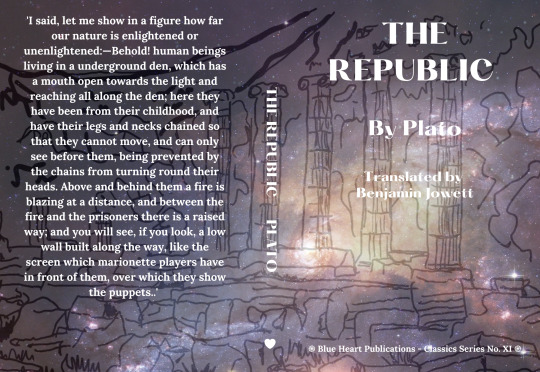
"The Republic," translated by Benjamin Jowett, stands as a timeless cornerstone in the philosophical canon, an intellectual odyssey that navigates the intricate landscapes of justice, politics, and the philosopher's pursuit of truth. Penned by Plato in the 4th century BCE, this Socratic dialogue remains a foundational work in political philosophy, ethics, and metaphysics. Jowett's translation, undertaken in the 19th century, preserves the essence of Plato's probing inquiries and dialectical brilliance, allowing readers to engage with the profound ideas that continue to shape the foundations of Western thought.
Plato's magnum opus unfolds as a series of dialogues, primarily led by Socrates, engaging with various interlocutors. The central exploration revolves around the question of justice, which becomes a metaphorical vessel for the examination of the ideal state, the role of individuals within society, and the nature of knowledge itself. The allegory of the cave, the tripartite division of the soul, and the philosopher-king are just a few facets of this multifaceted work that have reverberated through the corridors of academia for centuries.
The dialogue begins with an inquiry into the nature of justice as Socrates engages with characters like Thrasymachus, Glaucon, and Adeimantus. The discourse takes a dramatic turn as Plato introduces the allegory of the cave, an enduring metaphor for the journey from ignorance to enlightenment. This vivid imagery captures the transformative power of education and the philosopher's duty to ascend from the shadows of ignorance into the illuminating realm of true knowledge.
"The Republic" also ventures into the construction of an ideal state, led by philosopher-kings who possess both intellectual acumen and a commitment to the common good. Plato's vision challenges conventional notions of governance and explores the intricacies of a society governed by wisdom rather than mere political expediency. The dialogue delves into the organization of classes, the role of education, and the philosopher's ability to perceive the ultimate Form of the Good.
Benjamin Jowett's translation captures the nuances of Plato's intricate prose while maintaining accessibility for modern readers. His careful rendering of Socratic dialogues preserves the conversational tone and intellectual rigor that characterize the original work. Jowett's translation, though dated, remains widely used and respected, emphasizing the enduring appeal and significance of "The Republic" across generations.
"The Republic" is not merely an exploration of political theory; it is a profound meditation on the human condition. Plato's insights into the nature of knowledge, the complexities of justice, and the philosopher's role in society transcend the historical and cultural contexts in which they were conceived. The work prompts readers to question the foundations of their beliefs, to examine the societal structures they inhabit, and to consider the eternal pursuit of wisdom as a guiding principle.
In conclusion, "The Republic" by Plato, in Benjamin Jowett's translation, is a philosophical masterpiece that continues to shape the intellectual landscape. Its profound inquiries into justice, governance, and the nature of reality invite readers to embark on a philosophical journey that transcends time. The enduring relevance of Plato's ideas, coupled with Jowett's insightful translation, ensures that "The Republic" remains an indispensable text for anyone seeking a deeper understanding of the complexities of human existence and the perennial quest for a just society.
Plato's "The Republic" is available in Amazon in paperback 16.99$ and hardcover 24.99$ editions.
Number of pages: 471
Language: English
Rating: 10/10
Link of the book!
Review By: King's Cat
#Plato#The Republic#Socratic dialogue#Benjamin Jowett#Political philosophy#Ethics#Metaphysics#Ideal state#Justice#Knowledge#Allegory of the cave#Tripartite division of the soul#Philosopher-king#Thrasymachus#Glaucon#Adeimantus#Education#Allegory#Ideal society#Common good#Organization of classes#Form of the Good#Intellectual acumen#Political expediency#Conversational tone#Intellectual rigor#Human condition#Philosophical journey#Wisdom#Historical context
3 notes
·
View notes
Text
"Wise men talk because they have something to say; fools, because they have to say something."
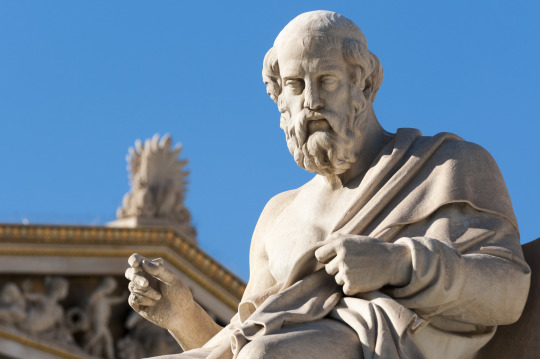
Plato was an ancient Greek philosopher born in Athens during the Classical period in Ancient Greece. In Athens, Plato founded the Academy, a philosophical school where he taught the philosophical doctrines that would later become known as Platonism
#Plato#Philosophy#Ancient Greece#Socratic dialogue#Dialogues#Idealism#Metaphysics#Epistemology#Ethics#Politics#Theory of Forms#Allegory of the Cave#Platonic love#Virtue#Knowledge#Soul#Education#Justice#Plato's Republic#Platonic philosophy#quoteoftheday#today on tumblr
3 notes
·
View notes
Text
“Sam, Ah say it’s caution, not nature dat keeps folks off uh red-hot stove.”
“How is de son gointuh be before his paw? Nature is de first of everything. Ever since self was self, nature been keepin’ folks off of red-hot stoves. Dat caution you talkin’ ’bout ain’t nothin’ but uh humbug. He’s uh inseck dat nothin’ he got belongs to him. He got eyes, lak somethin’ else; wings lak somethin’ else—everything! Even his hum is de sound of somebody else.”
-Zora Neale Hurston
5 notes
·
View notes
Photo

(link)
#twitter#screenshot#plato#aristotle#socratic dialogue#tweet threads#gigachad dialogues#humor#fitting
2 notes
·
View notes
Text
Harnessing the tools of the past and reflections on Growing Together
Harnessing the tools of the past and reflections on Growing Together
Recently I decided to reflect on some of my older blog posts as part of my journey into discovering new beginnings. Part of my process has been discovering things from past experiences as a means of fostering new avenues of growth. Through this deliberate work I have gained insights that are helping to guide me as I continue along my path forward.
I believe the work of reflection, of reviewing…

View On WordPress
#growth#journeying forward#new beginnings#new beginnings spiritual coaching and consulting llc#norman cousins#Pirkei Avot#Socratic dialogue#spiritual growth#Spirituality#The Celebration of Life
2 notes
·
View notes
Text
"The Republic: Plato's Timeless Exploration of Justice, Politics, and the Philosopher's Quest"
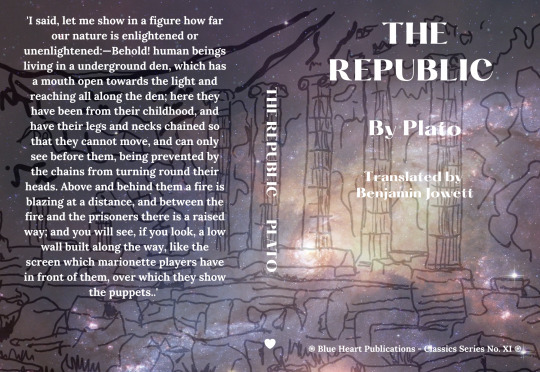
"The Republic," translated by Benjamin Jowett, stands as a timeless cornerstone in the philosophical canon, an intellectual odyssey that navigates the intricate landscapes of justice, politics, and the philosopher's pursuit of truth. Penned by Plato in the 4th century BCE, this Socratic dialogue remains a foundational work in political philosophy, ethics, and metaphysics. Jowett's translation, undertaken in the 19th century, preserves the essence of Plato's probing inquiries and dialectical brilliance, allowing readers to engage with the profound ideas that continue to shape the foundations of Western thought.
Plato's magnum opus unfolds as a series of dialogues, primarily led by Socrates, engaging with various interlocutors. The central exploration revolves around the question of justice, which becomes a metaphorical vessel for the examination of the ideal state, the role of individuals within society, and the nature of knowledge itself. The allegory of the cave, the tripartite division of the soul, and the philosopher-king are just a few facets of this multifaceted work that have reverberated through the corridors of academia for centuries.
The dialogue begins with an inquiry into the nature of justice as Socrates engages with characters like Thrasymachus, Glaucon, and Adeimantus. The discourse takes a dramatic turn as Plato introduces the allegory of the cave, an enduring metaphor for the journey from ignorance to enlightenment. This vivid imagery captures the transformative power of education and the philosopher's duty to ascend from the shadows of ignorance into the illuminating realm of true knowledge.
"The Republic" also ventures into the construction of an ideal state, led by philosopher-kings who possess both intellectual acumen and a commitment to the common good. Plato's vision challenges conventional notions of governance and explores the intricacies of a society governed by wisdom rather than mere political expediency. The dialogue delves into the organization of classes, the role of education, and the philosopher's ability to perceive the ultimate Form of the Good.
Benjamin Jowett's translation captures the nuances of Plato's intricate prose while maintaining accessibility for modern readers. His careful rendering of Socratic dialogues preserves the conversational tone and intellectual rigor that characterize the original work. Jowett's translation, though dated, remains widely used and respected, emphasizing the enduring appeal and significance of "The Republic" across generations.
"The Republic" is not merely an exploration of political theory; it is a profound meditation on the human condition. Plato's insights into the nature of knowledge, the complexities of justice, and the philosopher's role in society transcend the historical and cultural contexts in which they were conceived. The work prompts readers to question the foundations of their beliefs, to examine the societal structures they inhabit, and to consider the eternal pursuit of wisdom as a guiding principle.
In conclusion, "The Republic" by Plato, in Benjamin Jowett's translation, is a philosophical masterpiece that continues to shape the intellectual landscape. Its profound inquiries into justice, governance, and the nature of reality invite readers to embark on a philosophical journey that transcends time. The enduring relevance of Plato's ideas, coupled with Jowett's insightful translation, ensures that "The Republic" remains an indispensable text for anyone seeking a deeper understanding of the complexities of human existence and the perennial quest for a just society.
Plato's "The Republic" is available in Amazon in paperback 16.99$ and hardcover 24.99$ editions.
Number of pages: 471
Language: English
Rating: 10/10
Link of the book!
Review By: King's Cat
#Plato#The Republic#Socratic dialogue#Benjamin Jowett#Political philosophy#Ethics#Metaphysics#Ideal state#Justice#Knowledge#Allegory of the cave#Tripartite division of the soul#Philosopher-king#Thrasymachus#Glaucon#Adeimantus#Education#Allegory#Ideal society#Common good#Organization of classes#Form of the Good#Intellectual acumen#Political expediency#Conversational tone#Intellectual rigor#Human condition#Philosophical journey#Wisdom#Historical context
0 notes
Text
R.I.P. Socrates, you would have loved people who make fake Twitter accounts to just argue with themselves¡
0 notes
Text

I am normal about plato's Alcibiades 1
#art#alcibiades#socrates#plato#idk if i ever officially said this but i'm trying to both translate and modify this dialogue to fit in a comic#that I hope to have ready for the next con in may which means I need to have it ready by early ferbuary#i bit off way more than I can chew it feels like my brain is melting
225 notes
·
View notes
Text
not to be an annoying cunt but as long as everybody's chill about it differences in opinion should be more socially acceptable in fandom spaces. it’s so boring when everyone in a community is supposed to agree on everything.
#maybe i am just a classics major who enjoys dialogues and talking through different perspectives but.#disagreements can be interesting!! as long as everyone involved is being cool then there shouldn’t be anything wrong with that situation#someone do socratic dialogue about doctor who with me. please please please please pl#delia.txt
54 notes
·
View notes
Text
i was literally a preteen when the twilight movies were coming out do u know how much i FOUGHT how hard i RESISTED. there were girls in my class exchanging rpatz stickers!! he was EVERYWHERE! my MOM had a crush on him! but i did NOT thirst over that sickly white man when the entire world was on their knees and then on one random weekend at my grown age of 23 i decided to watch the batman and
#robert pattison#like the socratic dialogues i had with my friends over him not being hot.... only to right now be rabid over his unwashed self as they have#their big girl jobs at meta? insane trajectory.#the batman
238 notes
·
View notes
Text
On intimacy
rated M | 4k | BuckTommy
Buck is able to be very open like this. The intimacy soaks into his body and loosens his tongue. He can allow himself to be vulnerable. Tommy knows this by now, and whenever he needs some insight into Buck’s mind he’ll prompt him and just let him talk it out. Tommy will listen with interest, offer some small reassurances or insights, but otherwise just hold him while he talks.
“I have a question,” Tommy says softly, hand trailing up and down Buck’s arm, “but I don’t want it to sound like a judgment, or like I’m picking at old wounds for no reason. I’m just genuinely curious.”
“Okay,” Buck says. He’s a little nervous but he trusts Tommy, knows he won’t ask anything bad, knows he’ll drop it if Buck doesn’t want to talk about it.
“Can we go back to your ‘ally’ comment for a minute? From our first date,” Tommy asks.
Buck groans and hides his face in Tommy’s strong chest. “I mean yeah, but why?”
“I just wanna know. What did you mean by that? I haven’t been able to get it out of my head. You were on a date with a man you were interested in. You had to have known you were more than an ally at that point.”
Or:
Tommy wants to understand Buck a little better. Buck is good at monologuing, and he's done a lot of self-reflection since their first date.
[read on ao3]
#911#911 abc#bi buck#bucktommy#tevan#ignoring all the bucktommy buddie drama. anyway read my socratic dialogue on buck's ally comment. they're in bed and they're cute
31 notes
·
View notes
Text
#socrates#poll#socposting#you can be a part of every dialogue ever with this one trick!#very curious as to which will win
50 notes
·
View notes
Text
EVERYONE ON THIS WEBSITE IS WRONG ABOUT SOCRATES
#mod felix#speaking my truth.#like yeah the dude monologues but the other guys are still there for a reason... you know that right... right...#plato could've used literally any other format to get his ideas across and he chose dialogues... surely that means something...#also the guys who talk to him are generally speaking his friends and they can and do leave whenever they want...#sorry. i'm a socrates defender and the more i see people hating on him the less nuance i have about it
22 notes
·
View notes
Text

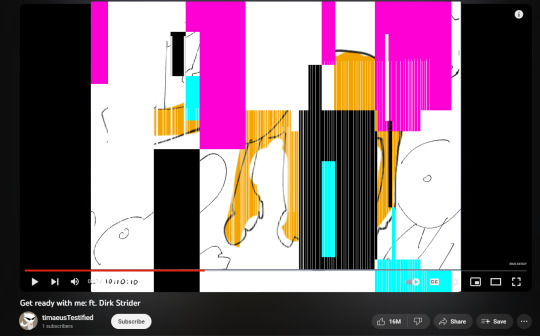


We're on air.
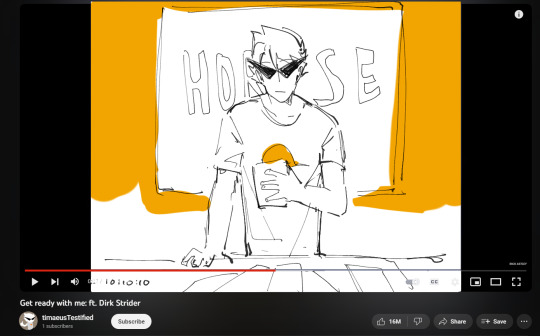
More precisely, I was on air when I recorded this, but the details are largely irrelevant. Because I don't really feel like covering fuckin' introductory quantum mechanics and telling you exactly how the influence of the Skaian universe, when applied at the quark level and taken alongside the probabilistic effect of quantum behavior, superposes via particle states and results in the formation of what you might refer to as "overlapping timelines". And that's already getting real abecedarian about this shit.
Yeah, sue me. Try boning up on basic physics while you're at it.
So. I'm sure you'd love to hear about how I managed to rig this sick as hell channel-cum-blog up and get it to straddle the space-time continuum like an antediluvian Olympic gymnast doing mad splits over baby's first toy pony, but that ain't the point of this little exercise. Posting what's effectively a vlog is enough of an onanistic venture without adding Skaian Principles For Dummies: Electric Boogaloo to the schedule.
Where was I?
(Rhetorical question. Don't answer, if it needed to be said.)
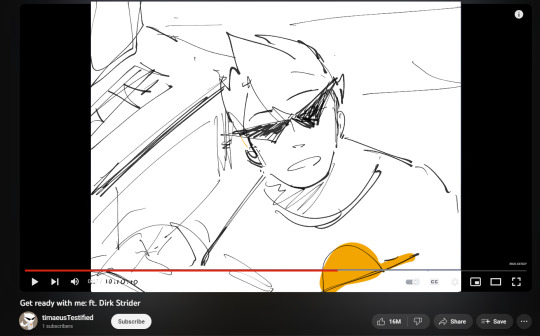
The name's Dirk.
Strider. Yeah, that Strider.
I'd be more worried about internet safety, but seeing as there are only up to two people alive around here no matter how far you pull my timeline back, and I'm one of 'em, it doesn't exactly compute. Face it, brosephine: you aren't getting to year 24xx post-hilarocaust, and you sure aren't getting past that. Wasn't shat out of a lab yet when you were committing identity theft and scamming doddering old ladies out of their sadsack pensions.
(If you manage to get pizza delivered out here, I'll tip extra.)
Besides, you already knew my name, didn't you?
Maybe your next question's going to be:
"Why are you calling this a vlog when it's obviously just a blog?"
Or maybe,
"Why is your URL poorlydrawndirk when it's totally malapropos?"
Buckle in, kids. Strap yourself into that convertible toddler-safe harness and keep your ass glued tight to all the prime polyester-lined foam, because this ride's about to pull into the station and vehicular standards are some passé 21st century horseshit.
The first thing you have to understand is that even peering upon the brink of these echelons of irony is a skill that you'll never grasp in your life. But that's fine. I'm around. And if it puts your mind at ease,
I'll be the one pulling the strings here.
(There's the tired callback. It's not wrong, but it's tired. Worn out enough for it to be begging you to take it out back behind the shed and put it out of its misery.)
(I'll leave it at that for now, because self-referencing is one thing, but if I get any more meta, I'll have to start narrating in twelve-point Times New Roman.)
Anyway, I'll be breaking it down, just this once. Magnanimous as hell, I know. I could wax poetic and in doing so obfuscate the actual meaning once more from obtuse minds, thereby adding another strata to irony so layered that it's settled past sedimentary and is ready to unearth some fossil formations, but let's be real. That shit would fly over your head so far it'd be trying to dial ground control at Houston.
Here we go.
Vlogs aren't cool; making one ironically is.
Putting in this much effort into making a multiversal vlog makes it cooler, ironically.
Putting in this much effort to make a multiversal vlog when the doomed timelines are all inherently fuckin' doomed, as the name implies, and therefore functionally useless to communicate with, makes it more ironic.
I have Heart powers and am able to achieve my ultimate self through my alpha timeline. Therefore, not only is this pimped-out vlog functionally useless, but I actually don't need it at all.
Which means this wasn't too hard to set up to begin with. Ironic, considering the complex presupposed conditions necessary for bridging that 'verse gap.
And despite framing this as a vlog, this is obviously a blog.
Even though it's just a blog, all these drawings I've made had you convinced that I really thought I was posting a vlog.
And in a way, I'm still making one. It ain't the traditional format, but the almost videographic mannerisms I've been laying on you more than compensate for the fact that the video part of "vlog" doesn't exist.
Except it does, for me.
And because it does, none of these pictures are drawn to begin with. They're all film stills. Screenshots, if you prefer.
Which makes the qualifier of "poorly drawn" untrue.
But it's also almost true, because you can call them poorly drawn by virtue of them not even being drawn. Ride that definition of "poorly" down the one-way rail and you're here, selfie central, population two, me and you.
Of course, that means we have to cover the quandary of truth itself. What constitutes the truth? Titillate that thought for a second.
If I consider the attached files to be selfies, but you consider them to be illustrations, which is it actually?
An analysis of the "truth" means that we have to start delineating how much of this is subjective, tying us in bed with the concept of knowledge. The Socratic take calls for dialectical conversation and inquiry via questioning; therefore, if I just bequeath my knowledge to you on a pretty little metaphorical platter, it won't mean fuckall. So we have to keep digging. Get your pickaxe ready, 'cause we ain't hitting any diamonds of wisdom any time soon.
In fact, maybe that ain't the right direction. Flip it turnways. We gotta climb a li'l higher for what we need.
Maybe we gotta head to the roof.

now. brought cal.
where making this HAPEN.

Haha.
Just fuckin' with you.

Welcome to my blog, dude.
Want water? Imagine I got you a nice, chilled glass.
Let's get this parasocial relationship pumping.
Questions? Concerns? Misguided pseudo-parental queries about whether or not it's safe for your pipsqueak to be exposed to a full dose of radically Stridered bullshit?
Cool.
Make it all three and drop it in the asks, yeah?
#Dirk Strider#Homestuck#Homestuck Fanart#Bro Strider#Ask Blog#((#No set timeline! primarily dirk but occasionally other splinters. yeah that includes scratch because why not. it sounds funny.#not a kinnie not a fictive! just a guy with a little bit of time and some bad ideas.#please note that it took dirk approximately five hours in the video to get ready. thank you.#yes the intro is one very lengthy quasi-shitpost. I was going to cover sincerity and the socratic dialogues even more#except it was already really long. lol. anyway I don't have 3 hours to write a more detailed explanation of all the layers of irony but#'trust me bro'#this is a regular askblog despite being named like one of the 'badlydrawn' ones.#im not gonna write long ass monologues at everything i just thought it'd be funny here#i'll spice up the actual blog layout later. for now - hope you enjoyed!#Also - runs not daily prob closer to weekly))
54 notes
·
View notes
Text
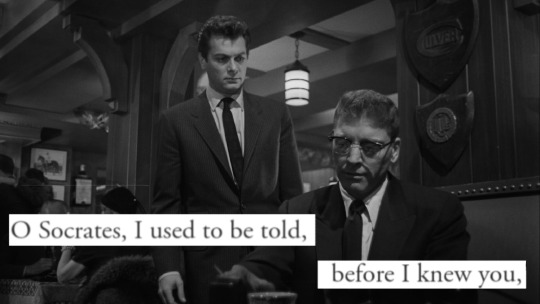





plato's meno (3rd/4th century BCE) + sweet smell of success (1957)
#i am insane abt this part of the dialogue....#funnily enough i kinda despise reading platos socratic dialogues but GODDAMN can plato write homoeroticism#the things he'd have to say abt sweet smell of success............#also i can't edit for shit ik this sucks ass#but if i didn't do it who would?#sweet smell of success
67 notes
·
View notes
Text
Ratio isn't just socratic nor is his method just socratic. There's a lot of sophist too, with how he is paid and the Genius Society looks down on that.
#I think there's a bit of that playing there too in his concept character-wise#although yeah obviously the socratic method and arguably in general platonism are more present#With the mention and even use of maieutics‚ reductio ad absurdum‚ and the way we argue and dialogue with him to reach conclusions#The way the story with him is played by arguing with him first and then working together to reach conclusions#is so platonic-dialogue-structured‚ especially with the use of memory#Knowledge as something already in us but forgotten that we can get to if pressed with the right questions and perspectives#Very good#I'll stop before I go on about this even further. I was writing more tags than I should. I'll just delete them and stay quiet but. Yeah#I do love this man a lot#And I hate that I do xD I can't believe I'm so easy#I talk too much#Dr. Ratio#Ratio#Traces#Sorry if this appears in the tag I want to keep this idea for later on. Ignore me
16 notes
·
View notes